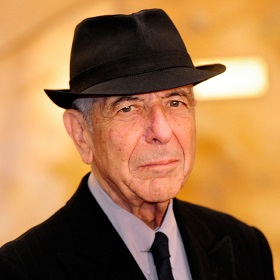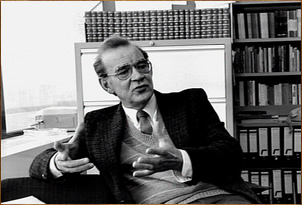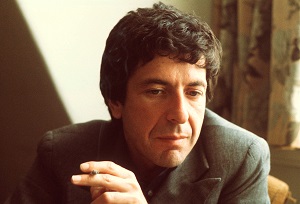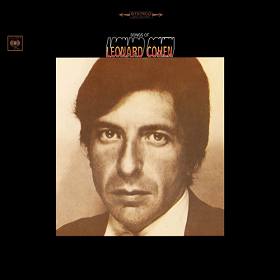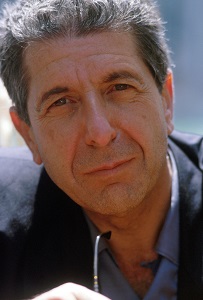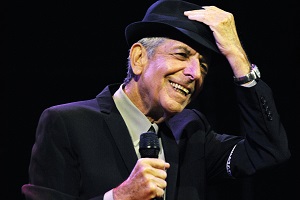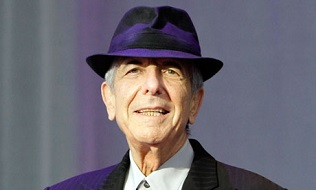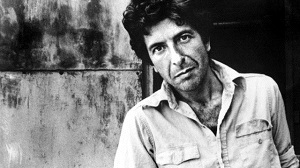De Canadese dichter, folk singer-songwriter en schrijver Leonard Cohen werd geboren op 21 september 1934 te Montréal. Zie ook alle tags voor Leonard Cohen op dit blog.
Uit: The favorite game
“3
His father lived mostly in bed or a tent in the hospital. When he was up and walking he lied. He took his cane without the silver band and led his son over Mount Royal. Here was the ancient crater. Two iron and stone cannon rested in the gentle grassy scoop which was once a pit of boiling lava. Breavman wanted to dwell on the violence. “We’ll come back here when I’m better.” One lie. Breavman learned to pat the noses of horses tethered beside the Chalet, how to offer them sugar cubes from a flat palm. “One day we’ll go riding.” “But you can hardly breathe.” His father collapsed that evening over his map of flags on which he plotted the war, fumbling for the capsules to break and inhale.
4
Here is a movie filled with the bodies of his family. His father aims the camera at his uncles, tall and serious, bou-tonnieres in their dark lapels, who walk too close and enter into blurdom. Their wives look formal and sad. His mother steps back, urging aunts to get into the picture. At the back of the screen her smile and shoulders go limp. She thinks she is out of focus.
Breavman stops the film to study her and her face is eaten by a spreading orange-rimmed stain as the film melts. His grandmother sits in the shadows of the stone balcony and aunts present her with babies. A silver tea-set glows richly in early Technicolor. His grandfather reviews a line of children but is stopped in the midst of an approving nod and ravaged by a technical orange flame. Breavman is mutilating the film in his efforts at history. Breavman and his cousins fight small gentlemanly battles. The girls curtsy. All the-children are invited to leap one at a time across the flagstone path. A gardener is led shy and grateful into the sunlight to be pre-served with his betters. A battalion of wives is squeezed abreast, is decimated by the edge of the screen. His mother is one of the first to go. Suddenly the picture is shoes and blurred grass as his father staggers under another attack. “Help!” Coils of celluloid are burning around his feet. He dances until he is saved by Nursie and the maid and punished by his mother. The movie runs night and day. Be careful, blood, be careful.”
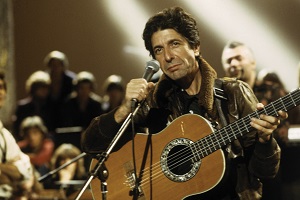
Leonard Cohen (21 september 1934 – 7 november 2016)
De Amerikaanse schrijver Stephen Edwin King werd geboren in Portland, Maine, op 21 september 1947. Zie ook alle tags voor Stephen King op dit blog.
Uit: The Outsider
“He was prepared for another of those accusing stares, but Terry only glanced at him briefly, and with no expression at all, before turning his attention to Bill Samuels, who had taken a seat in one of the three chairs on the other side of the table.
Studying Samuels now, Ralph began to get an idea of how he had risen so high so quickly. While the two of them were standing on the other side of the one-way glass, the DA had simply looked a bit young for the job. Now, facing Frankie Peterson’s rapist and killer, he looked even younger, like a law office intern who had (due to some mixup, probably) landed this interview with a big-time perp. Even the little Alfalfa cowlick sticking up from the back of his head added to the role the man had slipped into: untried youth, just happy to be here. You can tell me anything, said those wide, interested eyes, because I’ll believe it. This is my first time playing with the big boys, and I just don’t know any better.
“Hello, Mr. Maitland,” Samuels said. “I work in the county DA’s office.”
Good start, Ralph thought. You are the county DA’s office.
“You’re wasting your time,” Terry said. “I’m not going to talk to you until my lawyer gets here. I will say that I see a sizeable wrongful arrest suit in your future.”
“I understand that you’re upset, in your position, anyone would be. Maybe we can iron it out right here. Can you just tell me where you were when the Peterson boy was killed? That was on last Tuesday afternoon. If you were somewhere else, then—”
“I was,” Terry said, “but I intend to discuss that with my lawyer before I discuss it with you. His name is Howard Gold. When he gets here, I’ll want to talk to him privately. I assume that’s my right? Since I’m presumed innocent until proven guilty?”
Quick recovery, Ralph thought. A career criminal couldn’t have done it better.
“It is indeed,” Samuels said. “But if you haven’t done anything—”
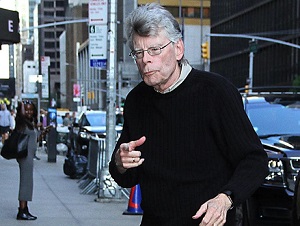
Stephen King (Portland, 21 september 1947)
De Franse schrijver Frédéric Beigbeder werd geboren op 21 september 1965 in Neuilly-sur-Seine. Zie ook alle tags voor Frédéric Beigbeder op dit blog.
Uit: Une vie sans fin
“Si le ciel est dégagé, on peut voir la mort toutes les nuits. Il suffit de lever les yeux. La lumière des astres défunts a traversé la galaxie. Des étoiles lointaines, disparues depuis des millénaires, persistent à nous envoyer un souvenir dans le firmament. Il m’arrive de téléphoner à quelqu’un que l’on vient d’enterrer, et d’entendre sa voix, intacte, sur sa boîte vocale. Cette situation provoque un sentiment paradoxal. Au bout de combien de temps la luminosité diminue-t-elle quand l’étoile n’existe plus ? Combien de semaines met une compagnie téléphonique à effacer le répondeur d’un cadavre ? Il existe un délai entre le décès et l’extinction : les étoiles sont la preuve qu’on peut continuer de briller après la mort. Passé ce light gap, arrive forcément le moment où l’éclat d’un soleil révolu vacille comme la flamme d’une bougie sur le point de s’éteindre. La lueur hésite, l’étoile se fatigue, le répondeur se tait, le feu tremble. Si l’on observe la mort attentivement, on voit que les astres absents scintillent légèrement moins que les soleils vivants. Leur halo faiblit, leur chatoiement s’estompe. L’étoile morte se met à clignoter, comme si elle nous adressait un message de détresse… Elle s’accroche.
Ma résurrection a commencé à Paris, dans le quartier des attentats, le jour d’un pic de pollution aux particules fines. J’avais emmené ma fille dans un néo-bistrot nommé Jouvence. Elle mangeait une assiette de saucisson de bellota et je buvais un Hendrick’s tonic concombre. Nous avions perdu l’habitude de nous parler depuis l’invention du smartphone. Elle consultait ses WhatsApp pendant que je suivais des top-models sur Instagram. Je lui ai demandé ce qu’elle aimerait le plus comme cadeau d’anniversaire. Elle m’a répondu : «Un selfie avec Robert Pattinson.» Ma première réaction fut l’effarement. Mais à bien y réfléchir, dans mon métier d’animateur de télévision, je réclame aussi des selfies. Un type qui interroge des acteurs, des chanteurs, des sportifs et des hommes politiques devant des caméras ne fait rien d’autre que de longues prises de vue à côté de personnalités plus intéressantes que lui. D’ailleurs, quand je sors dans la rue, les passants me réclament une photo en leur compagnie sur leur téléphone, et si j’accepte volontiers, c’est parce que je viens d’accomplir exactement la même démarche sur mon plateau entouré de projecteurs. Nous menons tous la même non-vie ; nous voulons briller dans la lumière des autres. L’homme moderne est un amas de 75 000 milliards de cellules qui cherchent à être converties en pixels.”
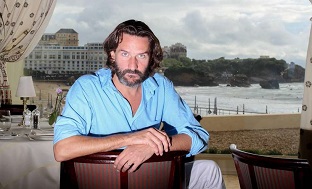
Frédéric Beigbeder (Neuilly-sur-Seine, 21 september 1965)
De Vlaamse dichter Xavier Roelens werd op 21 september 1976 in Rekkem (Menen) geboren. Zie ook alle tags voor Xavier Roelens op dit blog.
Volg vanaf daar de richtingaanwijzers
de wegen verbonden tegenstrijdige steden.
nam een man de benen, in ganzenpas
en binnen zijn te brede denkmal.
bij omlegging van het heden onthoudt de aarde
zich – zonverblind en teruggetrokken onder het asfalt.
Zo de hersenschors. Zo de maatschappij.
Zo de zonnebril. Zo de val/vrijpartij.
Zo wij. Zo jij. Zozo
sloeg een man op de vlucht naar Rio
en dwong hem tot een noodlanding.
leer, beleef, creëer, geniet
ik pretendeer geenszins haar te lijf te gaan
het is haar vinger delete
haar netvlies dat me
geen pixel verliest, nu ik uitgelogd wordt.
spelend met de muis lay-out ze haar lichaam
likt haar link in den Hoge, verzamelt haar netwerk
ze voedt de volgende generatie
ze downloadt, dus://
ik Error 404, als het niet stoort. gewoon
om herop te starten: ik pretendeer enz.
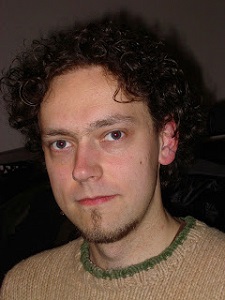
Xavier Roelens (Rekkem, 21 september 1976)
De Amerikaanse schrijfster en actrice Fannie Flagg (eig. Patricia Neal) werd geboren op 21 september in Birmingham (Alabama). Zie ook alle tags voor Fannie Flagg op dit blog.
Uit: Can’t Wait to Get to Heaven
“Then she suddenly began to wonder if she had turned off her oven before she had gone out in the yard to pick figs; or if she had fed her cat, Sonny, his breakfast yet. She also wondered what that boy in the ugly green shower cap and those other people leaning over, busy poking at her, were saying. She could see their lips moving all right, but she had not put her hearing aid on this morning, and all she could hear was a faint beeping noise, so she decided to try to take a little nap and wait for her niece Norma to come get her. She needed to get back home to check on Sonny and her stove, but she was not particularly looking forward to seeing her niece, because she knew she was going to get fussed at, but good. Norma was a highly nervous sort of a person and, after Elner’s last fall, had told her time and time again, not to get up on that ladder and pick figs. Norma had made her promise to wait and let Macky, Norma’s husband, come over and do it for her; and now not only had Elner broken a promise, this trip to the emergency room was sure to cost her a pretty penny.
A few years ago, when her neighbor Tot Whooten had gotten that needle-nosed hound fish stuck in her leg and wound up in the emergency room, Tot said they had charged her a small fortune. On reflection, Elner now realized that she probably should have called Norma; she had thought about calling, but she hadn’t wanted to bother poor Macky for just a few figs. Besides, how could she know there was a wasps’ nest up in her tree? If it weren’t for them, she would have been up and down that ladder with her figs, making fig preserves by now, and Norma would have been none the wiser. It was the wasps’ fault; they had no business being up there in the first place. But at this point she knew that all the excuses in the world would not hold much water with Norma. “I’m in big trouble now,” she thought, before she drifted off. “I may have just lost ladder privileges for life.”

Fannie Flagg (Birmingham, 21 september 1944)
De Britse schrijver Herbert George Wells werd geboren op 21 september 1866 in Bromley, Kent. Zie ook alle tags voor H. G. Wells op dit blog.
Uit: God the Invisible King
“Modern religion bases its knowledge of God and its account of God entirely upon experience. It has encountered God. It does not argue about God; it relates. It relates without any of those wrappings of awe and reverence that fold so necessarily about imposture, it relates as one tells of a friend and his assistance, of a happy adventure, of a beautiful thing found and picked up by the wayside.
So far as its psychological phases go the new account of personal salvation tallies very closely with the account of “conversion” as it is given by other religions. It has little to tell that is not already familiar to the reader of William James’s “Varieties of Religious Experience.” It describes an initial state of distress with the aimlessness and cruelties of life, and particularly with the futility of the individual life, a state of helpless self- disgust, of inability to form any satisfactory plan of living. This is the common prelude known to many sorts of Christian as “conviction of sin”; it is, at any rate, a conviction of hopeless confusion. . . . Then in some way the idea of God comes into the distressed mind, at first simply as an idea, without substance or belief. It is read about or it is remembered; it is expounded by some teacher or some happy convert. In the case of all those of the new faith with whose personal experience I have any intimacy, the idea of God has remained for some time simply as an idea floating about in a mind still dissatisfied. God is not believed in, but it is realised that if there were such a being he would supply the needed consolation and direction, his continuing purpose would knit together the scattered effort of life, his immortality would take the sting from death. Under this realisation the idea is pursued and elaborated. For a time there is a curious resistance to the suggestion that God is truly a person; he is spoken of preferably by such phrases as the Purpose in Things, as the Racial Consciousness, as the Collective Mind.
I believe that this resistance in so many contemporary minds to the idea of God as a person is due very largely to the enormous prejudice against divine personality created by the absurdities of the Christian teaching and the habitual monopoly of the Christian idea. The picture of Christ as the Good Shepherd thrusts itself before minds unaccustomed to the idea that they are lambs.”
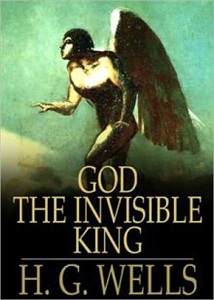
H. G. Wells (21 september 1866 – 13 augustus 1946)
Cover
De Duitse dichter Johann Peter Eckermann werd geboren op 21 september 1792 in Winsen (Luhe). Hij was bovenal de medewerker en vriend van Johann Wolfgang von Goethe.Zie ook alle tags voor Johann Peter Eckermann op dit blog.
Uit: Gespräche mit Goethe
“Mittwoch, den 11. Juni 1823
Diesen Morgen erhielt ich abermals eine Einladung zu Goethe, und zwar mittelst einer von ihm beschriebenen Karte. Ich war darauf wieder ein Stündchen bei ihm. Er erschien mir heute ganz ein anderer als gestern, er zeigte sich in allen Dingen rasch und entschieden wie ein Jüngling.
Er brachte zwei dicke Bücher, als er zu mir hereintrat. »Es ist nicht gut,«sagte er, »daß Sie so rasch vorübergehen, vielmehr wird es besser sein, daß wir einander etwas näher kommen. Ich wünsche Sie mehr zu sehen und zu sprechen. Da aber das Allgemeine so groß ist, so habe ich sogleich auf etwas Besonderes gedacht, das als ein Tertium einen Verbindungs- und Besprechungspunkt abgebe. Sie finden in diesen beiden Bänden die ›Frankfurter gelehrten Anzeigen‹ der Jahre 1772 und 1773, und zwar sind auch darin fast alle meine damals geschriebenen kleinen Rezensionen. Diese sind nicht gezeichnet; doch da Sie meine Art und Denkungsweise kennen, so werden Sie sie schon aus den übrigen herausfinden. Ich möchte nun, daß Sie diese Jugendarbeiten etwas näher betrachteten und mir sagten, was Sie davon denken. Ich möchte wissen, ob sie wert sind, in eine künftige Ausgabe meiner Werke aufgenommen zu werden. Mir selber stehen diese Sachen viel zu weit ab, ich habe darüber kein Urteil. Ihr Jüngeren aber müßt wissen, ob sie für euch Wert haben und inwiefern sie bei dem jetzigen Standpunkte der Literatur noch zu gebrauchen. Ich habe bereits Abschriften nehmen lassen, die Sie dann später haben sollen, um sie mit dem Original zu vergleichen. Demnächst, bei einer sorgfältigen Redaktion, würde sich denn auch finden, ob man nicht gut tue, hie und da eine Kleinigkeit auszulassen oder nachzuhelfen, ohne im ganzen dem Charakter zu schaden.«
Ich antwortete ihm, daß ich sehr gerne mich an diesen Gegenständen versuchen wolle, und daß ich dabei weiter nichts wünsche als daß es mir gelingen möge, ganz in seinem Sinne zu handeln.
»Sowie Sie hineinkommen,« erwiderte er, »werden Sie finden, daß Sie der Sache vollkommen gewachsen sind; es wird Ihnen von der Hand gehen.”
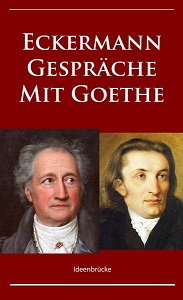
Johann Peter Eckermann (21 september 1792 – 3 december 1854)
Cover
Onafhankelijk van geboortedata
De Engelse schrijver Max Porter werd geboren in High Wycombe in 1981. Zie ook alle tags voor Max Porter op dit blog.
Uit: Grief Is the Thing with Feathers
“I lay back, resigned, and wished my wife wasn’t dead. I wished I wasn’t lying terrified in a giant
bird embrace in my hallway. I wished I hadn’t been obsessing about this thing just when the greatest tragedy of my life occurred. These were factual yearnings. It was bitterly wonderful. I had some clarity.
Hello Crow, I said. Good to finally meet you.
And he was gone.
For the first time in days I slept. I dreamt of afternoons in the forest.
CROW
Very romantic, how we first met. Badly behaved. Trip trap. Two-bed upstairs at, spit-level, slight barbed- error, snuck in easy through the wall and up the attic bedroom to see those cotton boys silently sleeping, intoxicating hum of innocent children, lint, flack, gack-pack-nack, the whole place was heavy mourning, every surface dead Mum, every crayon, tractor, coat,
welly, covered in a lm of grief. Down the dead Mum stairs, plinkety plink curled claws whisper, down to Daddy’s recently Mum-and-Dad’s bedroom. I was Herne the hunter hornless, funt. Munt. Here he is. Out. Drunk-for white. I bent down over him and smelt his breath. Notes of rotten hedge, bluebottles.
I prised open his mouth and counted bones, snacked a little on his un-brushed teeth, flossed him, crowly tossed his tongue hither, thither, I lifted the duvet.
I Eskimo kissed him. I butterfly kissed him. I flat-flutter Jenny Wren kissed him. His lint (toe-jam-rint) fuck-sacks sad and cosy, sagging, gently rising, then down, rising, then down, rising, then down, I was praying the breathing and the epidermis whispered ‘flesh, aah, flesh, aah, flesh, aah,’ and it was beautiful for me, rising (just like me) then down (just like me)
pan-shaped (just like me) it was any wonder the facts of my arrival under his sheets didn’t lift him, stench, rot-yot-kot, wake up human (BIRD FEATHERS UP YER CRACK, DOWN YER COCK-EYE, IN YER MOUTH) but he slept and the bedroom was a mausoleum. He was an accidental remnant and I knew this was the best gig, a real bit of fun.”
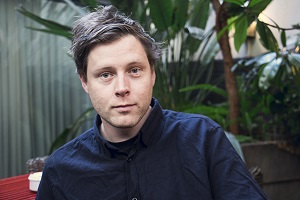
Max Porter (High Wycombe, 1981)
De Nieuw-Zeelandse schrijver Paul Ewen werd geboren in Blenheim, Nieuw Zeeland in 1972. Zie ook alle tags voor Paul Ewen op dit blog.
Uit: Space
“New Zealand is a country that is blessed with a great deal of space. This makes it a big drawcard for overseas visitors, a fact not lost on the tourism industry, who commission epic landscape photographs, usually barren and sparse, depicting vast mountain ranges, the purest lakes and fjords, untouched
rolling countryside, and large majestic pools of bubbling mud. You could be forgiven for thinking that no people actually live there.
As a New Zealander, I have managed to see a great deal of my country. Much of this has been through the window of my mate’s brown Cortina.
In its day, Steve’s Cortina transported the pair of us on a series of epic trips around the South and North Islands. Steve always drove (apart from one late-night incident in Cromwell when I mounted the
footpath), and he always insisted the Cortina was in fact copper, not brown.
At every new town we visited, a felt pennant of that province was added to the car aerial, and these flags rippled in the southern-hemisphere winds, most being reduced to tufty dags by the end
of each given trip. To occupy ourselves while travelling through the undeniably magnificent landscape, we would sometimes play car cricket, scoring runs based on the plenitude of oncoming traffic. An approaching car, for instance, would be one run, a motorbike two, and a truck four, but a passing campervan meant the ‘batsman’ was out.
Occasionally, driving in particularly sparse countryside, such as on the west coast of the South Island, we would wait bloody ages to score a single run. Some years later, I found myself living in Ho Chi Minh City, Vietnam, and on the occasion when I attempted to play car cricket, I scored about a million runs purely in motorbike traffic before I had to pull over, cross-eyed.
One of my theories of why there’s so much space in New Zealand is grounded in the fact that so many of my compatriots are out of the country on any given day. After Germany, New Zealand has the most nationals, per head of population, living or travelling abroad at any one time. A fair counter to my argument, however, may be that most of the space they leave behind is filled, in turn, with German tourists. Despite having loads
of space at home, New Zealanders love to spend time in places where there isn’t much space at all. Like aeroplanes. With backpacks crammed full of undies, T-shirts and woollen socks, they blast off, funded by student loans, attempting to bridge the vast gap between their country and the rest of the world.”
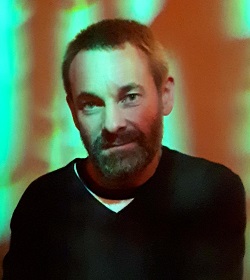
Paul Ewen (Blenheim, 1972)





